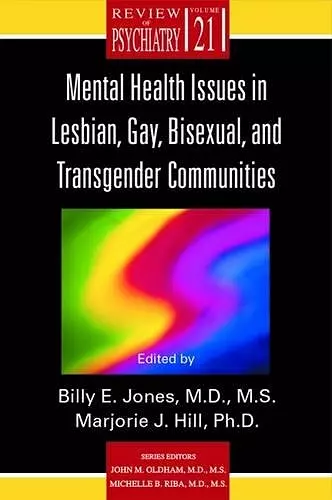Mental Health Issues in Lesbian, Gay, Bisexual, and Transgender Communities
John M Oldham editor Michelle B Riba editor Billy E Jones editor Marjorie J Hill editor
Format:Paperback
Publisher:American Psychiatric Association Publishing
Published:5th Jul '02
Currently unavailable, our supplier has not provided us a restock date

Over the last three decades, the visibility—and public acceptance—of self-identified lesbian women and gay men and bisexual and transgender individuals has increased dramatically, making it more important than ever to understand the dynamics of their relationships.
This timely work, part of Volume 21 in the Review of Psychiatry series, offers compelling facts and insights in a concise yet comprehensive format, bringing together the latest research and clinical practice in this rapidly evolving field.
• Chapter 1 details normal adolescent development and the extra challenges imposed by the development of a sexual identity that is different from that of most of their peers, including the lack of lesbian, gay, bisexual, and transgender role models.
• Chapter 2 presents a rare discussion about theoretical models (managing a concealable stigma, minority stress and resilience, and coping with multiple minority statuses) and empirical data on aging as a stigmatized sexual minority, including the similarities and differences of aging between the sexual minority communities and the heterosexual community and special issues in working with aging ethnic minority gay men, lesbians, and bisexual persons.
• Chapter 3 breaks new ground by detailing the expanding role of the psychiatrist or other mental health professional as forensic expert and therapist—requiring not only an in-depth understanding of lesbian and gay mental health issues, but also the often-daunting task of encouraging and teaching judges and juries to better understand these issues as they relate to discriminatory laws in child custody/visitation, workplace harassment/other discrimination, domestic violence, and immigration/asylum.
• Chapter 4 covers both the three types of etiological theories on homosexuality presented in the scientific literature and an historical overview of clinical attitudes toward homosexuality, from early modern theories (Karl Ulrichs, Krafft-Ebing, and Freud) to the present day, reporting on some adverse side effects of sexual conversion treatment that have been either overlooked or ignored in the reparative therapy literature and raising important clinical and ethical concerns.
• Chapter 5 examines the public and professional evolution of thinking toward U.S. African race and toward sexual orientation with regard to the reevaluation of the psychiatric diagnosis and treatment of gender identity disorder. Among other topics, the author presents a fascinating discussion of differences between sexual orientation and gender (e.g., anatomical, social, hormonal, psychological, legal, or...
The busy clinician will find this book a convenient and easy way to update a psychiatric approach to gender issues that no longer views sexual orientation as problematic, but addresses the stress of the person living in our culture that is not, in general, accepting of sexual difference.
-- Patricia E. Murphy, Ph.D. * Doody's Health Science Book Review Journal *Jones and Hill have created a volume that is both ambitious in scope and commendable for its inclusion of some of the more neglected elements and issues pertinent to LGBT communities.
-- Douglas C. Haldeman * Contemporary Psychology APA Review of BooISBN: 9781585620692
Dimensions: 229mm x 152mm x 3mm
Weight: 240g
140 pages